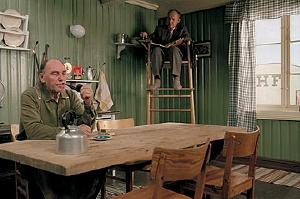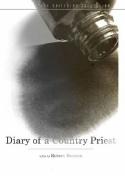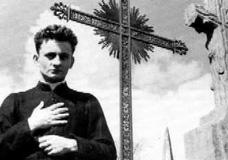|
Issue Date: March 26, 2004 Under the microscope 'Kitchen Stories' offers original humor; understated 'Diary' tells story of a soul By JOSEPH CUNNEEN
Kitchen Stories is an original comedy that should make your best-of-2004 list. Norwegian writer-director Bent Hamer derives extra fun from his material because everything is minimal and understated, beginning with its lunatic premise: the scientific observation by Swedes of the domestic habits of Norwegian bachelors. Though the film has English subtitles, they are almost unnecessary because so much of this subtle human story is conveyed in looks, gestures and small actions. Early in the post-World War II period, Sweden’s Home Research Institute sends a parade of caravans across the border to Norway, where they must reluctantly drive on the right-hand side of the road -- just one of the Swedish-Norwegian tensions that add to the humor. The strange stepladders strapped to the back of the vehicles are then set up in the kitchens of those who agreed to be observed. Each institute agent sits on top of one of these giant highchairs and methodically charts the kitchen movements of his elderly host, producing diagrams that suggest the intricate double-reverses of a fanatic football coach. Folke (Tomas Norström) is assigned to observe the enigmatic behavior of the elderly Isak (Joachim Calmeyer), who doesn’t cook anything in the kitchen and turns out the light every time he leaves the room. Bored and unhappy with his isolated life in the caravan, Folke nevertheless plays by the rules and doesn’t talk to Isak, since that would disrupt the objectivity of the study. Isak’s eyebrows alone convey what he thinks of this Swede perched in his kitchen; later, he looks down on Folke through a peephole in his bedroom closet. “Kitchen Stories” punctures the bubble of positivism more effectively than any philosophical argument. Folke can’t help but throw his own pack of pipe tobacco on the kitchen table when he sees Isak’s distress at his empty can, and the film slowly softens. The two men begin to talk, with Isak reminding Folke, “You Swedes were neutral observers during the war, too.” Folke even gives the old man a birthday party, complete with cake and bourbon. Isak is worried about his beloved horse’s sickness, however, and punctures the joyous scene with the observation, “Death is predetermined.” The evidence of their conviviality worries Folke’s boss, Malmberg (Reine Brynolfsson), who is wonderfully comic in his anxiety to maintain the institute’s scientific basis. Isak’s friend Grant (Bjørn Floberg) gets so angry when he spies the party through the window that he drags Folke’s caravan to the railroad tracks and leaves it there with its owner sleeping inside. Isak and his horse save him. “Kitchen Stories” makes good use of the loneliness of its setting and the bareness of Isak’s house. Human behavior, it implies, cannot be understood without human interaction, and Hamer’s success derives from the ability to arrange his material to complete the logic of its farcical preface while avoiding the pitfalls of sentimentality. The film offers a sober appreciation of life’s realities while leading us to a deeper appreciation of our own laughable peculiarities.
NCR readers will be delighted to learn that the Criterion Collection has just issued a DVD version of Robert Bresson’s 1951 classic, Diary of a Country Priest. Many are familiar with Georges Bernanos’ classic novel of a young priest with stomach cancer working in a hostile parish in northern France some years before World War II. But if they have only seen the film on video, they will have little idea of its aesthetic quality. The DVD is the product of a new high-definition digital transfer, with restored image and sound, and a new translation of subtitles. “Diary” appears at an especially appropriate time, allowing those who have seen Mel Gibson’s “Passion” a chance to compare it with a film that succeeds in suggesting the reality of the supernatural by the very restraint of its style. As French critic André Bazin has written, “Probably for the first time the cinema gives us a film in which the only genuine incidents are those of the life of the spirit. It also offers us a new dramatic form that is specifically religious -- or better still, specifically theological, a phenomenology of salvation and grace.”
“Diary” reveals Bresson’s insistence on avoiding the exploitation of superficial, readily available emotions; his films emphasize the hiddenness of God. He deliberately makes the diary form of the novel a key factor in concentrating audience attention on the life of the spirit. In theory, such a presentation ought to be dull, repeating what the images already reveal. In practice, the largely uninflected reading of the diary reinforces the sense of inner struggle. In a scene between the country priest and the older curé of Torcy (André Guibert), the latter insists that we all have to find the place in the Gospel where we personally encounter Jesus. A tear runs down the young man’s cheek as we hear the voice of the journal: “The truth is that my place for all time has been the Garden of Olives.” Bresson makes these words more poignant by refusing to overdramatize the situation; we hear the barking of a dog as the camera’s gradual withdrawal returns us to the world of appearances. Bresson did not try for striking individual shots. The only image he was concerned with was the bare cross that appears at the end after the young priest’s death. This same refusal to exploit emotion is behind his rejection of professional actors; he wanted to capture the automatism present in the unconscious gestures of his “models.” Claude Laydu, who played the title character, said that he did not realize he had been portraying a saint until he had seen the film. Joseph Cunneen is NCR’s regular movie reviewer. His e-mail address is SCUNN24219@aol.com.
National Catholic Reporter, March 26, 2004 |


